More trials than Al Capone? Trump dominates the GOP primary field, but his legal battles are intensifying
- Oops!Something went wrong.Please try again later.
On the presidential campaign trail in New Hampshire, Donald Trump boasted to laughter and applause he faces more indictments than late Chicago gangster Al Capone. He mentioned that Capone, “the greatest gangster of all time,” killed his adversaries.
He wasn’t done mingling politics and litigation. The former president and likely Republican nominee, who faces 91 charges across four cases from New York to Florida, suggested his winning margin in the Iowa Caucuses the day before might have been smaller if it was not for all the charges. He wasn't sure about trading fewer charges for less political support.
“I don’t know if I would’ve made the trade," Trump told the crowd in Atkinson, New Hampshire, on Jan. 16. "I might’ve just liked the position we’re in right now, and we’re doing very well on that score.”
Trump toggled this month between the snowy campaign trail and a blizzard of legal arguments at two civil trials he wasn’t required to attend. One judge scolded Trump for rambling testimony he complained sounded like a campaign rally. Another judge rebuked Trump for muttering too loudly with his lawyers.
“You just can't control yourself in this circumstance, apparently,” U.S. District Judge Lewis Kaplan told Trump on Jan. 17 at a defamation trial, the day after his New Hampshire speech.
Such confrontations could be replayed throughout the year. While legal experts say Trump's status as the likely GOP nominee won’t affect his legal standing, the former president could be juggling court dates with campaign stops through the November election. Early clashes revealed how he calibrates both types of appearances for the court of public opinion.
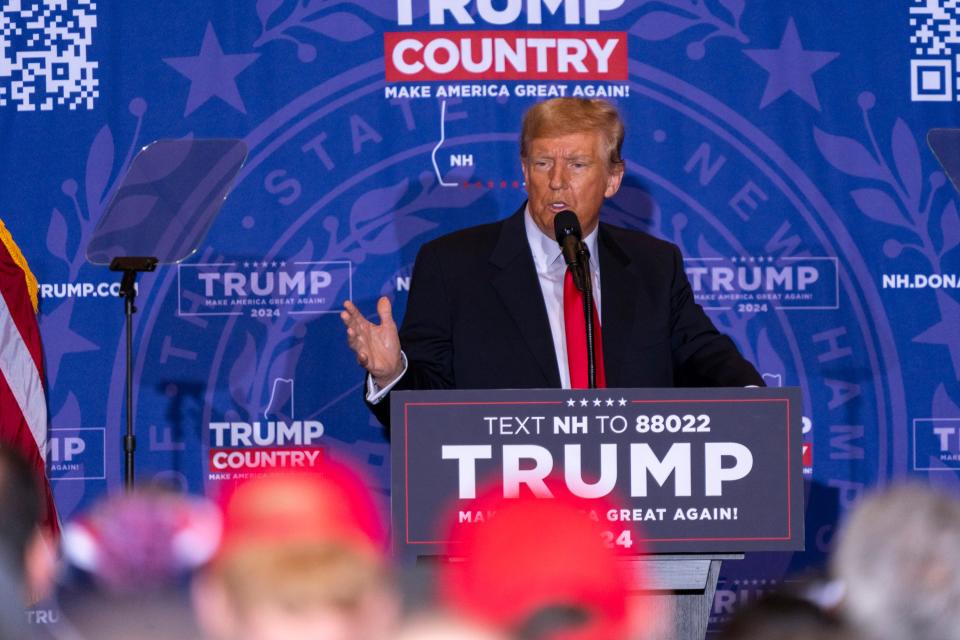
Trump bristles at restrictions as judges try to rein him in
In a federal defamation trial in New York, when potential jurors in a civil case were asked whether they felt mistreated by the court system, Trump mischievously raised his hand at the defense table to laughter in the gallery.
“We know how you stand,” Judge Kaplan said.
The gesture echoed the first presidential debate in August 2023, when six of eight of Trump’s Republican rivals for the White House raised their hands to say they’d support him as the nominee even if he were convicted of a crime.
Kaplan was presiding over a trial to determine how much Trump owes columnist E. Jean Carroll for denying he sexually assaulted her. The judge threatened to throw out Trump after he repeatedly made comments disparaging her testimony within earshot of jurors.
"Mr. Trump, I hope I don't have to consider excluding you from the trial,” Kaplan said. “I understand you're probably eager for me to do that.”
“I would love it,” Trump responded.
On Friday, Trump stood up and walked out on the closing argument of Carroll's lawyer, Roberta Kaplan, who told the jury he had already been found liable for sexually assaulting Carroll and defaming her.
Ultimately, Trump was hit with a stunning verdict in that case, and ordered to pay $83.3 million, an amount that is higher than what had been expected. Minutes after it was announced, Trump took to social media with fresh talking points and vowed to appeal. "Our Legal System is out of control, and being used as a Political Weapon," he said.
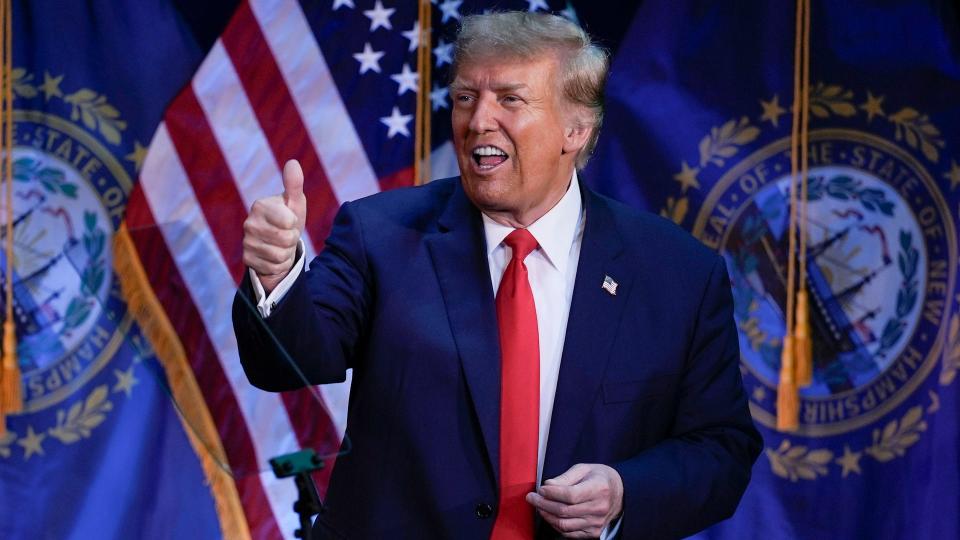
Will Trump's political success help him in the courtroom?
Trump's political status as the expected GOP nominee probably won’t change his position in four pending criminal cases.
“Trump’s victory in any primaries will not change the equation,” said Barbara McQuade, a former U.S. attorney and now a law professor at the University of Michigan. “He has been charged, and the public has an interest in a speedy trial.”
Trump has federal trials tentatively set for March in Washington, D.C., on federal charges he tried to overturn the 2020 election, and for May in Florida on charges he hoarded classified documents after leaving the White House. Trials are pending in Georgia on election interference charges and in New York on charges he falsified business records to hide hush-money paid to an adult film actress and a Playboy model.
Trump has blasted the charges as political persecution by Democratic opponents and has sought to delay the trials until after the Nov. 5 election. But legal experts say the political victories will have no impact in the legal arena.
"In terms of atmospherics and the political dynamic, the later the trials go, the more intense the conflict is with the political process," said Michael Waldman, CEO of the Brennan Center for Justice at New York University and a constitutional lawyer. "I don't think it'll affect the judges."
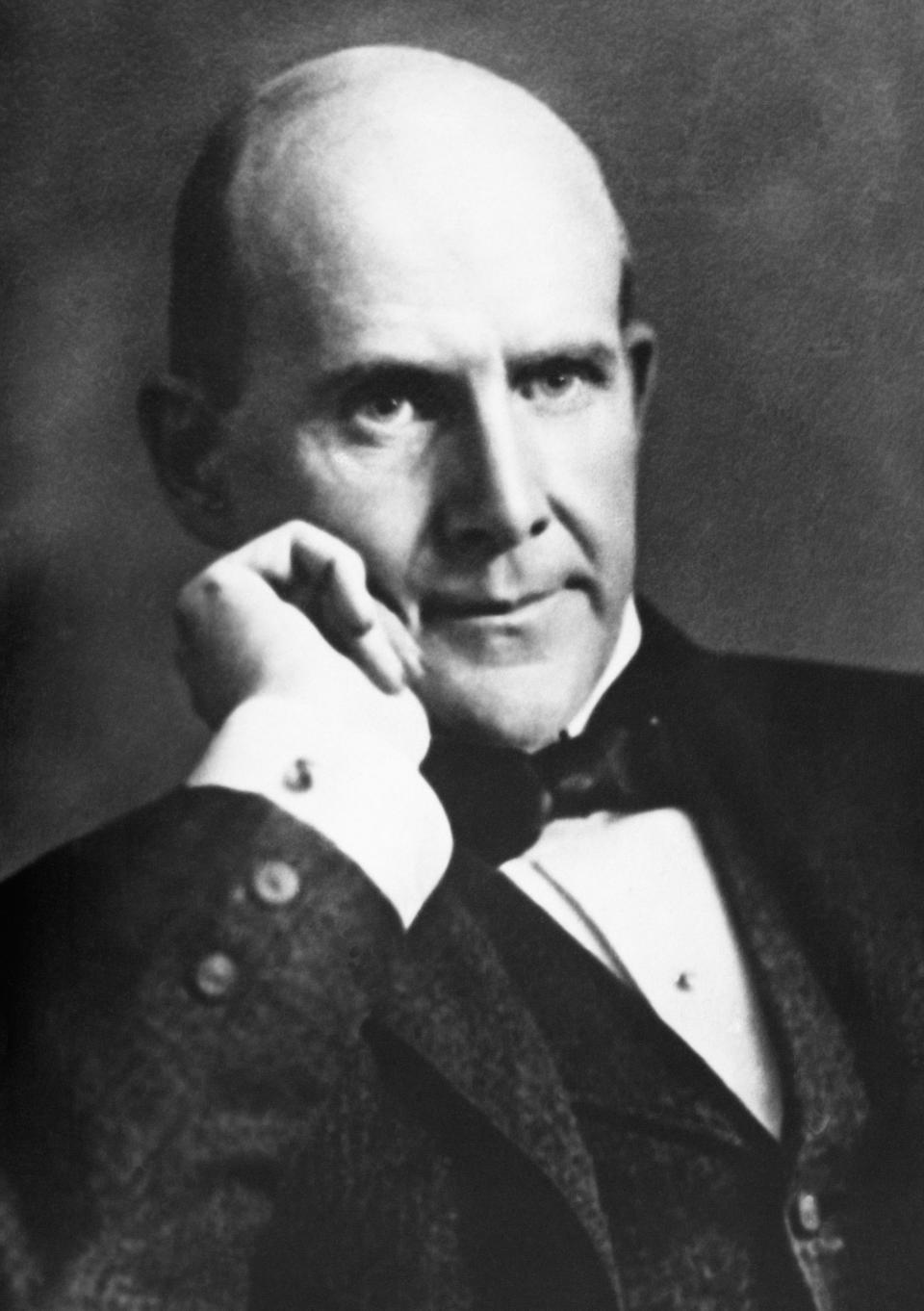
A Socialist campaigned from prison in 1920, and got 900,000 votes
Even if Trump were convicted, it wouldn't prevent him from running for president because he is expected to appeal and remain free through the election.
Waldman noted the Constitution doesn’t require a candidate to have a clean record to campaign. Eugene Debs, a Socialist, campaigned for president from prison in 1920 – and got about 900,000 votes.
“One of the unprecedented and nightmare scenarios is that the wheels of justice grind slowly and the election is ongoing and he’s convicted,” Waldman said. “It’s undeniable that it’s an extraordinary situation to have a former president indicted for multiple felony counts for trying to overthrow the last election and running in this election.”
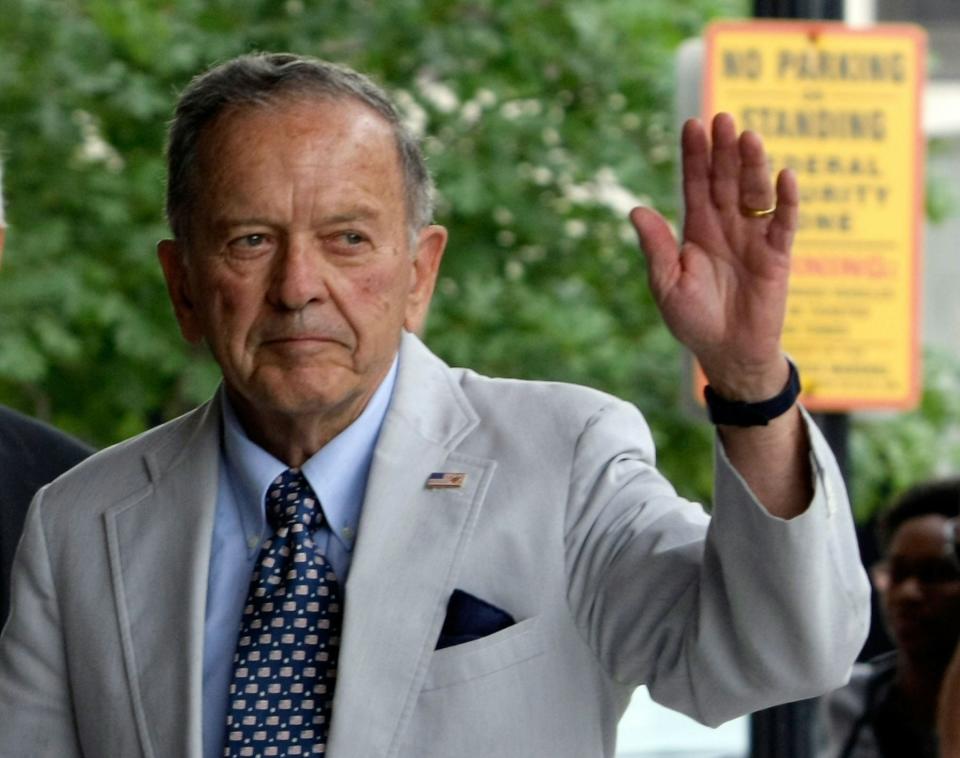
The public's right to a speedy trial?
The pace of federal trials can vary widely.
When Sen. Ted Stevens, R-Alaska, was indicted in 2008 on corruption charges, he sought a speedy trial before the election that year – and got it. He was indicted in July and convicted in October.
Stevens, who was then the longest-serving Republican senator, lost his re-election bid a week after the trial. But a few months later, U.S. District Judge Emmet Sullivan vacated the verdict before sentencing because of prosecutorial misconduct. Stevens died in a plane crash in August 2010.
The case against Chicago Alderman Edward Burke took longer, during a period when the COVID-19 pandemic slowed action in the courts. Burke was indicted in May 2019 on racketeering, bribery and extortion charges, and he was convicted in December 2023.
Burke had been accused of pressing real estate developers to hire his private law firm in exchange for official favors such as lucrative tax breaks. He filed so many motions challenging the charges and evidence that the first judge in the case left the bench a year before the trial even started.
Pace of Trump cases varies
Trump has been aggressive in filing motions in his criminal cases, so the pace of his cases could slow.
Trump was indicted last June on federal charges he mishandled classified documents after he left the White House, and U.S. District Judge Aileen Cannon tentatively scheduled the trial for May 20. But the case could be delayed because of arguments set for March about how to handle the top-secret papers.
Meanwhile, Trump was indicted last August – nearly two months after the documents case – on federal charges he tried to overturn the 2020 election. U.S. District Judge Tanya Chutkan set the trial for March 4 – months earlier than the documents case – although it may be postponed as appeals courts consider Trump’s claim of immunity.
“I wouldn’t be surprised if she continues to press forward with an early trial date regardless of what happens in the primaries,” Renato Mariotti, a former federal prosecutor, said of Chutkan. “Regardless of Trump’s status, it appears that Judge Cannon has put the Mar-a-Lago case on a very slow road. She has created delay where at times it was unnecessary in her rulings.”
On campaign trail, Trump mixes prosecutions with politics
At the campaign stop in Atkinson, Trump ridiculed the criminal cases as a political ploy. He accused the Justice Department and FBI of targeting President Joe Biden’s political opponents, which Biden and Attorney General Merrick Garland have denied.
“I got so many court cases. I’ve been indicted more than Alphonse Capone,” Trump said. “Greatest gangster of all time. He was the No. 1 of all time. Scarface.”
As part of the shtick, Trump said his Iowa victory may have been benefited from the persecution.
“If I didn’t get indicted all these times, and if they didn’t unfairly go after (me), I would’ve won, but it would’ve been much closer, I tell you,” Trump said.
Thirty harassing phone calls a day
The open question is how criminal courts will respond to Trump’s advocacy as he straddles the political and legal realms.
In Trump's civil fraud trial, New York Supreme Court Justice Arthur Engoron fined him a combined $15,000 for violating gag orders against criticizing his clerk Allison Greenfield for partisanship in a social media post. Trump blasted Engoron, the clerk and state Attorney General Letitia James repeatedly, arguing they are Democrats who were against him for political reasons.
Threats, harassment and disparaging comments against Greenfield "increased exponentially" after Trump falsely accused her of being Senate Majority Leader Chuck Schumer's girlfriend, according to Charles Hollon, who investigates such threats for the state Department of Public Safety. Greenfield received hundreds of threatening and harassing voicemail messages transcribed to 275 pages, Hollon said in a court filing. She received 20 to 30 calls per day and 30 to 50 messages on her social media accounts, Hollon said.
“In the current overheated climate, incendiary untruths can, and in some cases already have, led to serious physical harm, and worse,” Engoron wrote in his gag order.
Appeals courts upheld Engoron’s restrictions against commenting on court staff or government lawyers, along with a similar order by U.S. District Judge Tanya Chutkan, who is presiding over his election conspiracy case.
"We agree with the district court that some aspects of Mr. Trump’s public statements pose a significant and imminent threat to the fair and orderly adjudication of the ongoing criminal proceeding, warranting a speech-constraining protective order," Judge Patricia Millett wrote on behalf of a three-judge panel.
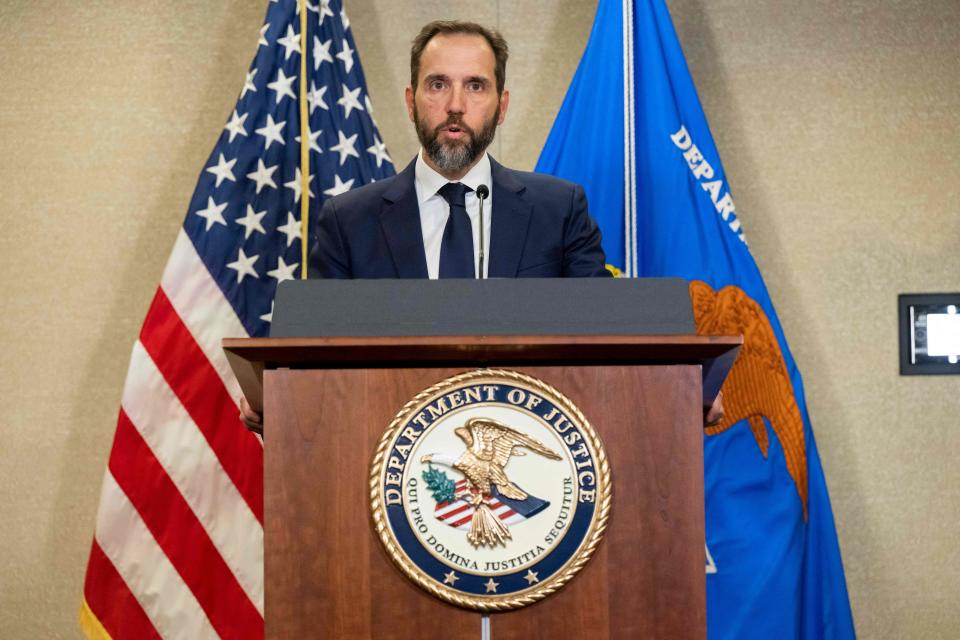
Unprecedented cases bring unique arguments: assassinating rivals with Seal Team 6?
Judges face unique disputes because no former president has ever been indicted before. The power and influence of Trump's former post figure in the equation.
Justice Department special counsel Jack Smith asked the Supreme Court to rule quickly on whether Trump has presidential immunity from charges he conspired to overturn the 2020 election. Trump claimed immunity because he was president when allegedly committing crimes between the election and the Capitol attack on Jan. 6, 2021.
The Supreme Court refused to immediately hear the case.
At the D.C. Circuit Court of Appeals, Trump lawyer John Sauer argued Trump should be shielded from any charges unless he was impeached and convicted in a Senate trial. The protection applied if Trump ordered SEAL Team 6 to kill his political opponent, Sauer said.
Trump weighed in with an all-caps post on social media on Jan. 18, a common tactic during the campaign and trials. He added he hopes it will eventually be an easy decision for the Supreme Court.
“A president of the United States must have full immunity, without which it would be impossible for him/her to properly function,” Trump said on Truth Social. “Even events that ‘cross the line’ must fall under total immunity, or it will be years of trauma trying to determine good from bad.”
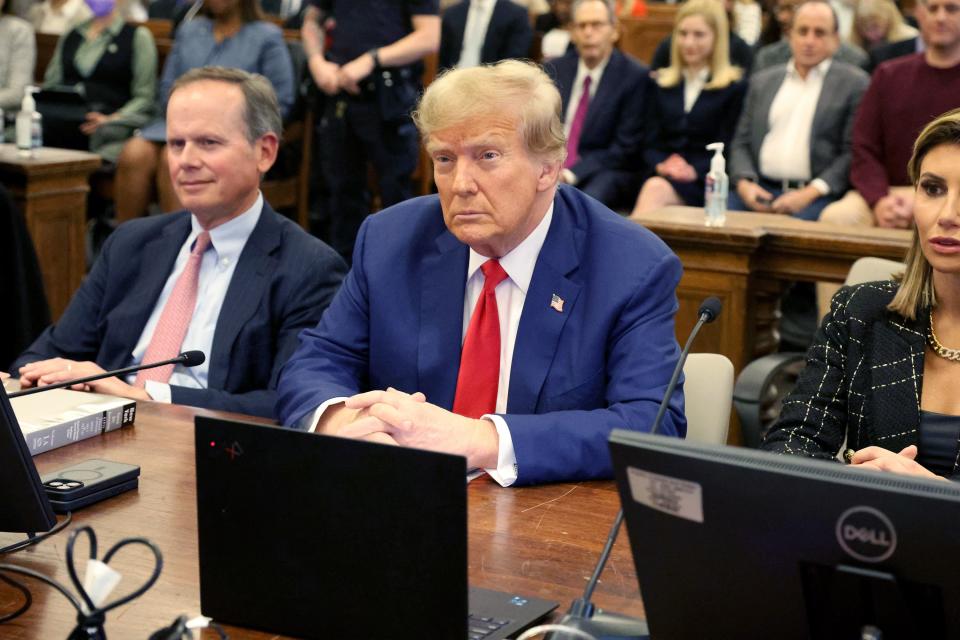
Trump trial 'not a political rally': judge
Trump’s two civil cases featured judges chiding the former president for speaking out of turn or digressing in his responses, while Trump bridles against restrictions.
In the fraud trial, Engoron is weighing whether to cancel Trump’s ability to do business in New York and penalize him potentially $370 million. Engoron erased parts of Trump’s testimony on Nov. 6 and scolded him repeatedly for not answering questions.
“This is not a political rally,” Engoron said. Later, he added, “he has a lot to say that has nothing to do with the case or the questions.''
The antagonism was mutual. On the witness stand, Trump called it a “crazy trial." He predicted: “I am sure the judge will rule against me because he always rules against me.”
“This is a very unfair trial, very, very,” Trump added later. “And I hope the public is watching it.”
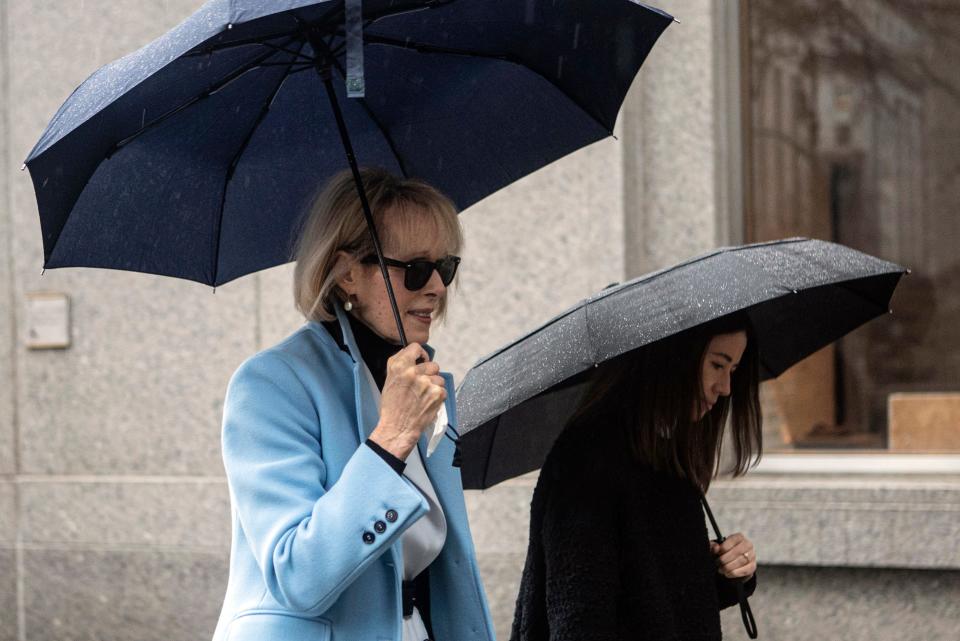
Trump's civil trials avoided 'big circus' despite the campaign
After large crowds gathered for some of Trump's arraignments, legal experts raised concerns about selecting juries and holding trials during the fanfare.
But New York judges in the recent state and federal civil trials were able to seat juries briskly and hold trials with just a handful of protesters outside the courthouses.
"It didn't turn into a big circus," Waldman said.
This article originally appeared on USA TODAY: Donald Trump wins GOP presidential contests, faces criminal trials

